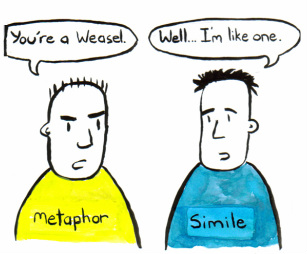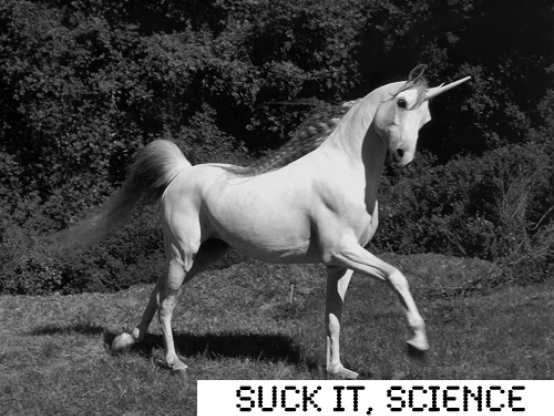Made Up Facts & True Beliefs
"The article below is not anti-science, so let's get that straight. It's really an article filled with nothing but true statements. I know they're true because I know, and if you knew what I know, you'd know they were true, as well. If that sounds like circular logic, it's not. It's merely logic that is traveling in an elliptical fashion around the circumference of my head. And, with words like "elliptical" and "circumference," you can rest assured that I know what I'm talking about"!
Most of us have some sense that we're right about our beliefs. That this is essentially illogical seems to have little effect most of the time. Logic tends to play, at best, a secondary role, and what role it does play is a lot like those nameless actors that used to die in just about every episode of Star Trek. You knew they were there strictly as dramatic fodder while the main actors were kept safe from harm. And so it goes with our beliefs. We never really place them in harms way, they remain tucked safely out of sight, with lesser considerations placed in the firing-line. Which is why topics like politics and religion are generally considered to be off limits in polite society. But this isn't polite society, so load your guns, cock your hammers, and prepare to watch as your cherished assumptions get blasted to bits....tiny, dead, little bits!
I always start with the premise that government is nothing more than a bunch of politicians trying to figure things out. Figure out what? Whatever they were sent to Washington to figure out! Past that, it gets kind of vague. There are supposed to be checks and balances placed on politicians, much in the same way a police officer can’t just pull out his gun and shoot people because they look like trouble makers. After all, how would you know who the trouble makers were—probably by looking in the mirror and saying, “Hey, if they look like that guy, they’re OK.” and then begin blasting everybody who doesn't look like the face in the mirror!
Whether most folks know it or not, this is what happens when politicians are given extraordinary powers to solve problems. I don’t mean extraordinary powers like Aqua Man, which would make things a lot more interesting, but power beyond their constitutional mandate. Power must be restrained by an even greater power, which rests with the citizenry. Without it, politicians have a blank check signed by the American people. And believe me; you don’t want to give a politician a blank check to do your shopping for you, unless you want to end up with the world’s most expensive yak farm.
If this sounds overly simplistic, think again. People are far more likely to feel positive about people who look and think like them, people with the same connections and same complexion. That would seem to permanently carve racism, or some other form of bigotry, in stone, an implacable roadblock to the good life. But, in this instance, I use the word “complexion” metaphorically to suggest an obvious similarity. So, watch out for those metaphors, because more are on the way—and metaphors can be more than just a self-conscious allusion to one’s poetic sensibilities, they can also be very scientific.
I once read an article about a man who was married to a wealthy Palm Beach socialite and who turned out to be a con-man. The other wealthy Palm Beach folk said, “He drives an expensive car, wears expensive clothes, knows about fine wines, he must be one of us”! When they found out that they had been duped by one of the common people, they began questioning whether the universe had betrayed them. Then they shambled along, drinking wines that cost more than your car, eating food that cost more than your kid’s college tuition, until sufficient time had passed to allow for “Self-conscious memory syndrome” to kick in. What that means is; when you don’t want to be reminded of how dumb you can be, you carefully block out that “bad memory” with “good thoughts” and retreat to the world within your head where you’re king and worshiped as a god.
I always start with the premise that government is nothing more than a bunch of politicians trying to figure things out. Figure out what? Whatever they were sent to Washington to figure out! Past that, it gets kind of vague. There are supposed to be checks and balances placed on politicians, much in the same way a police officer can’t just pull out his gun and shoot people because they look like trouble makers. After all, how would you know who the trouble makers were—probably by looking in the mirror and saying, “Hey, if they look like that guy, they’re OK.” and then begin blasting everybody who doesn't look like the face in the mirror!
Whether most folks know it or not, this is what happens when politicians are given extraordinary powers to solve problems. I don’t mean extraordinary powers like Aqua Man, which would make things a lot more interesting, but power beyond their constitutional mandate. Power must be restrained by an even greater power, which rests with the citizenry. Without it, politicians have a blank check signed by the American people. And believe me; you don’t want to give a politician a blank check to do your shopping for you, unless you want to end up with the world’s most expensive yak farm.
If this sounds overly simplistic, think again. People are far more likely to feel positive about people who look and think like them, people with the same connections and same complexion. That would seem to permanently carve racism, or some other form of bigotry, in stone, an implacable roadblock to the good life. But, in this instance, I use the word “complexion” metaphorically to suggest an obvious similarity. So, watch out for those metaphors, because more are on the way—and metaphors can be more than just a self-conscious allusion to one’s poetic sensibilities, they can also be very scientific.
I once read an article about a man who was married to a wealthy Palm Beach socialite and who turned out to be a con-man. The other wealthy Palm Beach folk said, “He drives an expensive car, wears expensive clothes, knows about fine wines, he must be one of us”! When they found out that they had been duped by one of the common people, they began questioning whether the universe had betrayed them. Then they shambled along, drinking wines that cost more than your car, eating food that cost more than your kid’s college tuition, until sufficient time had passed to allow for “Self-conscious memory syndrome” to kick in. What that means is; when you don’t want to be reminded of how dumb you can be, you carefully block out that “bad memory” with “good thoughts” and retreat to the world within your head where you’re king and worshiped as a god.

We all possess this ability as the result of evolution. It happened like this; a particular monkey needed to forget about that time he couldn't pull ants out of an anthill with a blade of grass and was embarrassed by his pathetic ant gathering skills—fast forward fifty million years and you get a human suffering with “Self-conscious memory syndrome.” All you have to do is take a behavior that is observable in humans and then apply it to a primitive monkey of some kind. Throw in a few million years, preferably multiples of ten, and you have science. Now, take that scientific “Fact” and give it a physical motive, like the need to eat or have sex, and you'll have your answer. The answer being; it must be true because it’s not just one kind of science, it’s actually two.
Right now you’re probably asking yourself how I know so many amazing facts. The simple answer; I made them up, just like Richard Dawkins and Albert Einstein. If they can make up facts, what’s to stop me from doing the same? If you don’t believe me go ask Richard Dawkins what a “meme” is. Or ask one of Albert Einstein’s many acolytes if time and space really is like a fabric, which is how we get the over-used cliche “the fabric of time and space” that’s been used in countless sci-fi novels.
Most of what we believe to be true is nothing more than theory. Freud made up all that business about the “Id, Ego and Super Ego” by observing human behavior. Sir Isaac Newton did the same with gravity and apples and Darwin did likewise with evolution. He observed a phenomenon and then began to infer from a few finch beaks an elaborate theory about how their beaks grew in order to get at the different seeds that thrived in different seasons. Unfortunately for Darwinists, saying they needed to, therefore they did, isn’t really much of a theory, not even if you add fifty million years—certainly no more so than my theory of “Self-conscious memory syndrome.” Both of which can be observed to be true, however, just because they're true doesn’t mean they’re not total bullshit.
This is the difference between cause and effect. We can observe the effect and still be completely oblivious to its cause. Or to put it another way; we can see the water come out of the faucet, why the water comes out of the faucet is another story. And why water comes out of the faucet, my friend, is one of the great mysteries of science. If you don’t believe me go ask any genius type about the laws of motion, or how gravity increases the weight of water and you’ll find a whole lot of stuttering and stammering, but precious little in the way of answers.
The why of finch beaks, the observance of psychological behavior, or the reality that there’s a force of attraction that pulls things to the earth doesn’t tell us a lot. It may tell us more than we previously knew, but that isn’t saying much.
I’m not suggesting that all the above geniuses were wrong; in fact it may be that they were exactly right, at least in a very limited way. There is, however, a yawning chasm (I don't mean to imply that the chasm is sleepy) between a theory and the how and why of it. You’d never know this when listening to the low level, groupie-scientist types who act as apologists for their particular scientific faith. Apparently, they hope that the relationship between themselves and the source of their adoration will enable them to achieve immortality, if not directly, then perhaps by proxy.
Attempting to ride Darwin’s coattails into eternity isn't a whole lot different than most religious theology regarding eternal life; it’s just obviously more metaphorical than literal, but the abuse of language and the impulse is largely the same. So, believe me, when I say you can trust me and take what I say to the bank. After all, I've used words like; science, metaphor, theology and self-conscious, and if that doesn't make me smart, I don’t know what would!
Right now you’re probably asking yourself how I know so many amazing facts. The simple answer; I made them up, just like Richard Dawkins and Albert Einstein. If they can make up facts, what’s to stop me from doing the same? If you don’t believe me go ask Richard Dawkins what a “meme” is. Or ask one of Albert Einstein’s many acolytes if time and space really is like a fabric, which is how we get the over-used cliche “the fabric of time and space” that’s been used in countless sci-fi novels.
Most of what we believe to be true is nothing more than theory. Freud made up all that business about the “Id, Ego and Super Ego” by observing human behavior. Sir Isaac Newton did the same with gravity and apples and Darwin did likewise with evolution. He observed a phenomenon and then began to infer from a few finch beaks an elaborate theory about how their beaks grew in order to get at the different seeds that thrived in different seasons. Unfortunately for Darwinists, saying they needed to, therefore they did, isn’t really much of a theory, not even if you add fifty million years—certainly no more so than my theory of “Self-conscious memory syndrome.” Both of which can be observed to be true, however, just because they're true doesn’t mean they’re not total bullshit.
This is the difference between cause and effect. We can observe the effect and still be completely oblivious to its cause. Or to put it another way; we can see the water come out of the faucet, why the water comes out of the faucet is another story. And why water comes out of the faucet, my friend, is one of the great mysteries of science. If you don’t believe me go ask any genius type about the laws of motion, or how gravity increases the weight of water and you’ll find a whole lot of stuttering and stammering, but precious little in the way of answers.
The why of finch beaks, the observance of psychological behavior, or the reality that there’s a force of attraction that pulls things to the earth doesn’t tell us a lot. It may tell us more than we previously knew, but that isn’t saying much.
I’m not suggesting that all the above geniuses were wrong; in fact it may be that they were exactly right, at least in a very limited way. There is, however, a yawning chasm (I don't mean to imply that the chasm is sleepy) between a theory and the how and why of it. You’d never know this when listening to the low level, groupie-scientist types who act as apologists for their particular scientific faith. Apparently, they hope that the relationship between themselves and the source of their adoration will enable them to achieve immortality, if not directly, then perhaps by proxy.
Attempting to ride Darwin’s coattails into eternity isn't a whole lot different than most religious theology regarding eternal life; it’s just obviously more metaphorical than literal, but the abuse of language and the impulse is largely the same. So, believe me, when I say you can trust me and take what I say to the bank. After all, I've used words like; science, metaphor, theology and self-conscious, and if that doesn't make me smart, I don’t know what would!

What is amazing is how quickly our adjectives and metaphors start taking on a distinctly theological tone. Let’s face it, you don’t get to be a prophet unless you can convince people of your miraculous insights and logic. That last statement is something of an “oxymoron” (A special emphasis should be placed on the last two syllables of that word).
It is, nonetheless, the way in which we are prone to think—a mix of awkward metaphors, self-righteous faith, and a hell of a lot of arrogance. If it sounds a lot like religion, it’s only because that’s exactly what it is. A basic faith that says, “There must be some truth, someone must be right, even if we really don’t know why.” And, if all we really have are theories, that can be enough to compel us to invest a good deal of blood, sweat and tears in the defense of our beliefs against the barbarians at the gate—meaning anybody that disagrees with us strenuously enough.
Striving to be right can be an important goal in itself—it’s a problem only if our being right is more important than being willing to find out that we might be wrong. Once that happens, the hunt for heretics begins, the self-righteous apostles of a new faith commence operating with the “blessed assurance” that ignorance and ego always thrive on. The rest of you, well, you can go to hell!
Mark Magula
It is, nonetheless, the way in which we are prone to think—a mix of awkward metaphors, self-righteous faith, and a hell of a lot of arrogance. If it sounds a lot like religion, it’s only because that’s exactly what it is. A basic faith that says, “There must be some truth, someone must be right, even if we really don’t know why.” And, if all we really have are theories, that can be enough to compel us to invest a good deal of blood, sweat and tears in the defense of our beliefs against the barbarians at the gate—meaning anybody that disagrees with us strenuously enough.
Striving to be right can be an important goal in itself—it’s a problem only if our being right is more important than being willing to find out that we might be wrong. Once that happens, the hunt for heretics begins, the self-righteous apostles of a new faith commence operating with the “blessed assurance” that ignorance and ego always thrive on. The rest of you, well, you can go to hell!
Mark Magula
|
|
|
